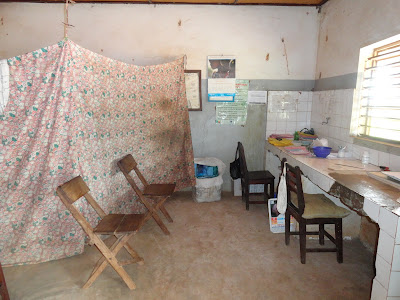 |
| The Sonsoro Health Center. This is where I will be working every day in my village. |
 |
| The delivery room. Most women give birth on the white metal table on the left. The babies are cleaned and prepped on the counter on the right. |
 |
| This is my colleague from the health center with his four children (his wife declined to be photographed since she is pregnant). |

The delivery room looks quite spartan. Where are woman while they are in labor? What happens if there is a complication during or after delivery? Are you acting as an untrained midwife? Is this a place where woman and children are waiting in line to be seen because there is such a great need for medical attention? What an experience you will have!!
ReplyDeleteJean Ralley
Women come to the health center when they start having contractions. They wait in the Dilation Room, essentially a waiting room with beds instead of chairs, until it is nearly time for the baby to be born. Then the woman goes into the delivery room, where she hops up on that white metal table to give birth. A metal dustpan is placed under the mom to collect the fluids, placenta, etc, that come out with and after the baby. If there are complications or a C-section is necessary, the woman is sent to Kandi to give birth. There is no electricity in the health center, so if a baby is born at night, the nurse delivers it by holding a cell phone in her mouth and shining it on the mother. The cell phone serves as a flashlight.
ReplyDeleteThe health center tends to be very busy, especially on pre-natal visit days and vaccination days, when women must wait hours to be seen. One challenge is that there is a lot of health information to be dispersed, especially about healthy pregnancy and breastfeeding, but the nurses simply don't have enough time to share this information.
So, I see, you will be giving out information about healthy pregnancy and breastfeeding along with information about vaccinations. Where have the doctors and nurses gotten their education?
ReplyDeleteJean Ralley
What doctors? There is a shortage of doctors in Benin, so they can only be found in big cities at the hospital. At our health center, we have a nurse/midwife, two nursing assistants, and a "pharmacist". The nurse and nursing assistants have done three years of training, if I remember correctly, at a special school. The nursing assistants must complete 9th grade before entering that school; I don't know if that's the case for the nurse. Technically speaking, the nursing assistants are only supposed to help prep vaccinations and hand tools to the nurse, but in reality, they do everything the nurse does because of a shortage of trained staff. When the nurse and pharmacist went on vacation for a few weeks, the nursing assistants did everything.
ReplyDeleteFor complicated procedures, patients are referred to the hospital in Kandi, where there are doctors.
I must have read into "colleague," doctor, which I remember being surprised about. My mistake. Might you be called in to help with vaccinations?
ReplyDeleteJean Ralley
I meant to say "What doctors?" with that certain vocal intonation that says, yes, you're right, there should be doctors, but there aren't. I guess vocal intonation is hard to insert into text. Your comment was perfect in that it unknowingly highlighted one of the big challenges that Benin faces in health: underqualification and understaffing.
ReplyDeleteOne of my roles will be to get more children to the vaccinations and help get more children to do the entire vaccination series. There is a lot of waiting around on vaccination day, so it is a good opportunity to teach health messages to a captive audience of our main target population (mothers). Unfortunately, usually none of my colleagues are free for the needed translation, however.
Another thing I did while visiting Sonsoro was alphabetize the vaccination cards. They had been stored in no particular order, so finding a single card meant sorting through the entire stack. Since we have to match health books to vaccination cards for all attendees, a lot of time is wasted each vaccination day simply looking for the matching card.
Alex
You have a greater need for learning the language. Do you have any way to do that now? Really too bad they don't speak French. Is the entire series as many as babies are getting here? My new granddaughter gets multiple vaccines at each doctor visit. It is definitely different than when my children were that age.
ReplyDeleteJean Ralley